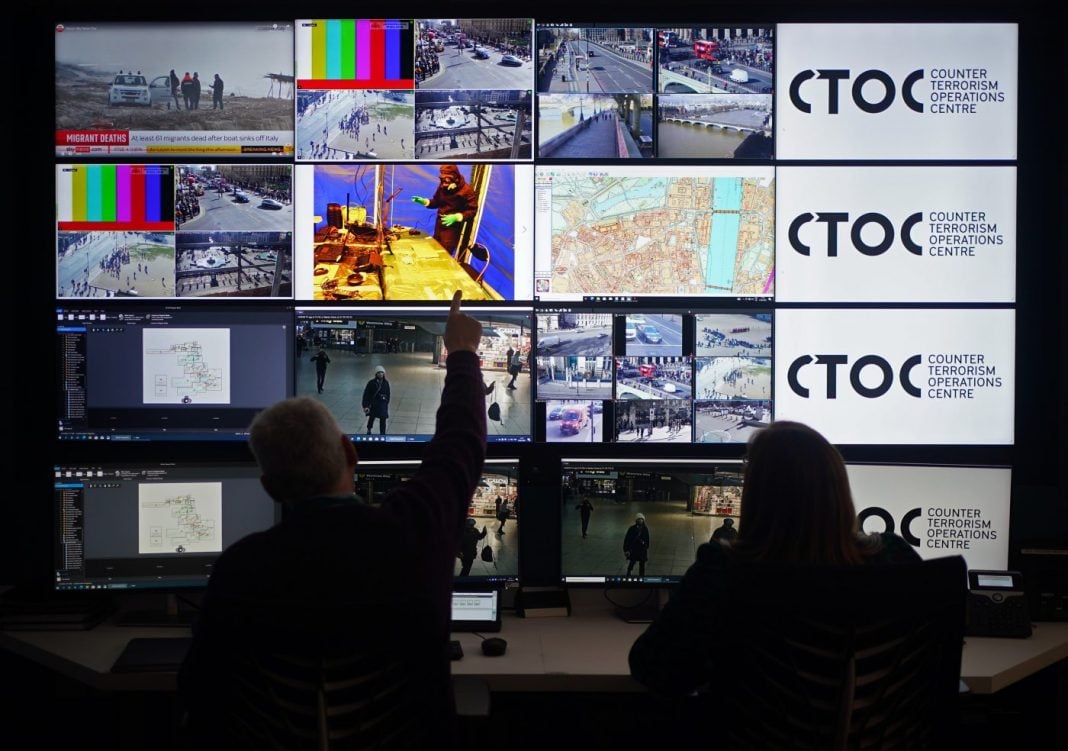A profound anxiety about the espionage capabilities of the UK and France is rooted deep in the Kremlin’s consciousness.
By Irina Borogan and Andrei Soldatov, for CEPA
While the US administration keeps seeking a deal with Putin, Moscow’s spy masters are shifting their attention to the confrontation with their two main adversaries in Europe. These are the British and French intelligence agencies, though for different reasons.
Russian intelligence mandarins have always been obsessed with the British, considering them much superior in spy craft than the Americans, and the Cold War didn’t really affect that judgment.
After all, the British are the only intelligence agency ever accused of directly plotting to overthrow the regime in Moscow (apart from Vladimir Lenin’s relationship with the Germans during World War I, still an embarrassment for the official historic narrative). It hardly matters to a paranoid Kremlin that this attempt occurred more than a hundred years ago, soon after the Russian Revolution of 1917.
The British had a significant intelligence operation in post-revolutionary Russia, originally to support and observe its wartime ally, and ultimately to subvert the Bolshevik regime and its calls for global revolution.
RH Bruce Lockhart, an acting British Consul-General in Moscow at that time, was accused of funneling large sums of rubles to Latvian troops (Lenin’s praetorian guard) in an attempt to stage an anti-Bolshevik coup d’état in 1918, with the assistance of the renowned spy, Sidney Reilly. Bruce Lockhart was arrested by the Cheka, charged with plotting the assassination of Bolshevik leaders, and later exchanged for Maxim Litvinov, who had been held in a British prison and would become Soviet foreign minister under Stalin. Reilly was tricked into returning to Russia, captured, and executed.
Ever since “the Lockhart plot”, Moscow’s spy agencies have treated British spies with a mix of fear and admiration. In a way, it became a love-hate relationship that went well beyond operational logic.
In the 1960s, when Moscow’s spies first ventured into publicity and began directly sponsoring spy movies, like The Dead Season, made in 1968. It was British films they imitated, and British spies cast as a primary enemy for the KGB.
The film’s main attraction was its atmospherics. Filmed in black and white against a grey background (a little like the British movie, The Spy Who Came in From the Cold, 1965), men in their late forties and fifties, dressed in grey and black raincoats, talk in quiet voices and do very little. The action scenes begin only at the very end.
The plot centers around the duplicity and cynicism of an unnamed enemy power (the British are never explicitly named, but all the signs point to Britain). Its behavior is deeply cynical and dangerous — the enemy employs a wanted Nazi war criminal to continue his research to create a neurochemical weapon. The film’s top consultant was Konon Molody, a KGB illegal agent (i.e., a spy with no diplomatic accreditation) who had worked in the UK under the guise of a Canadian businessman until he was arrested and later swapped.
The film was an instant success, with 35 million Soviet people seeing it. It had a huge and prolonged impact on the KGB rank and file: Putin once admitted that the film inspired him to join the security service.
The Soviet spy services also encouraged printed works for the propaganda war. The 1960s saw a plethora of books published, and again, the main KGB effort was directed at Britain. Moscow sponsored the publication of books written by the British espionage traitors Kim Philby and Donald Maclean, members of the so-called Cambridge Five (although, curiously, only Philby’s book was translated into Russian).
In the 1970s and 1980s, Kim Philby was treated with admiration bordering on idolization by KGB intelligence officers about to be posted to the UK. As part of their training program, he briefed them on what it was like to be British. And indeed, the young KGB officers came to imitate Philby’s habits and mannerisms.
After the collapse of the Soviet Union, many of those officers — still serving in what became known as the Foreign Intelligence Service (SVR) — organized an informal “English club,” housed in a blue-and-white mansion on Kolpachny Lane in central Moscow, which also hosted the SVR’s press center. The circle included Yuri Kobaladze, head of the SVR press office, and Mikhail Lyubimov, a KGB veteran turned spy novel writer, both of whom had served in London during the Cold War.
Coincidentally, some of those Philby admirers had spent some years in the disinformation department of Russian intelligence — the department not only involved in “active measures” across the world but also largely responsible for redefining the image of the SVR after the collapse of the Soviet Union. In this effort, Russian spies were presented as more refined, cultured, worldly, and even liberal, in contrast to the brutal KGB officers who had served inside the country. This highly successful rebranding helped shield the SVR from reforms in the 1990s.
Moscow’s spy masters came to believe that the British were unmatched in manipulating both their enemies and allies. Vitaly Shlykov, head of the Soviet military intelligence economic intelligence department under Gorbachev, once told the authors, with frank admiration, how he read about the British Security Coordination (BSC) — a branch of UK intelligence in the US during World War II — while he was held in a Swiss prison in the 1980s as an exposed GRU illegal. Shlykov believed that the BSC had effectively manipulated the US government both during the war and long after.
He was not alone in his beliefs. Inside the Putin regime, suspicions of British deviousness have only grown stronger. As early as 2007, the First Channel, the country’s main TV outlet, aired the series Great Game (which portrays continuous British plotting against Russia), created by Mikhail Leontyev, one of the Russian propagandists closest to Putin.
The main message of the series was that the Cold War didn’t start in 1949 and didn’t end in 1991, with the British once again identified as the primary adversary. The series was aired again in 2008 — right after the Russian war in Georgia — and once more in March 2022, following the full-scale invasion of Ukraine. Open British support for Ukraine in the war only supported Moscow’s paranoia: Russian special forces have also suspected for years that the elite British army unit, the SAS, was involved in the conflict (apparently with some reason).
France found itself in the Russian crosshairs for a different set of reasons. Since 2022, there has been a growing belief in Moscow that France was assigned by the Western intelligence community to lure defectors and deserters to the West — a mortal sin in the eyes of the Kremlin, given how Moscow has always been paranoid about the threat of Russian soldiers, spies, and diplomats changing sides. And indeed, throughout the 20th century, Russia did produce an extraordinary number of defectors.
These suspicions only grew stronger when, in 2023, France made the remarkable decision to welcome Russian military deserters. The French National Asylum Court granted safe haven to 19 men in July 2023. The court adopted a doctrine according to which Russian nationals were to be granted refugee status if they could “prove that they face a personal risk of persecution if they return to Russia due to their non-compliance with the partial mobilization in the context of the war waged by the Russian armed forces against Ukraine”.
In October, six Russian soldiers who had fled the battlefield in Ukraine or didn’t want to participate in the war arrived in France from Kazakhstan without travel documents or foreign passports. They were granted entry permits to seek political asylum in France, the first major case of a group of deserters being admitted to a European country. By that time, human rights activists counted over 2,000 Russian soldiers who had fled abroad.
Moscow also became increasingly paranoid about the possible direct involvement of the French military in the war. In January 2024, when the eastern Ukrainian city of Kharkiv was hit by a missile strike that killed dozens, Russian news agencies claimed that the strike had targeted a group of French mercenaries fighting on the Ukrainian side (the claim was immediately rejected by the French).
The Kremlin’s suspicions will only be deepened by the events of recent months. With France and Britain offering to form the backbone of a European-led military force in Ukraine as part of a ceasefire deal — a prospect that has always been the Kremlin’s biggest nightmare.
By Irina Borogan and Andrei Soldatov, for CEPA
Andrei Soldatov and Irina Borogan are Non-resident Senior Fellows with the Center for European Policy Analysis (CEPA.) They are Russian investigative journalists and co-founders of Agentura.ru, a watchdog of Russian secret service activities.
Europe’s Edge is CEPA’s online journal covering critical topics on the foreign policy docket across Europe and North America. All opinions expressed on Europe’s Edge are those of the author alone and may not represent those of the institutions they represent or the Center for European Policy Analysis. CEPA maintains a strict intellectual independence policy across all its projects and publications.





